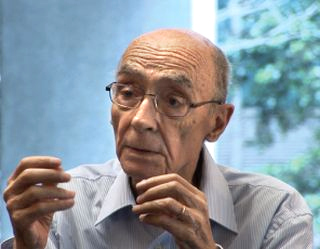José Saramago nejznámější citáty
„Kdybych umřel v 60, nic bych nenapsal.“
Originál: (en) I had died when I was 60, I would have written nothing.
Zdroj: [Hopkinson, Amanda, José Saramago obituary, guardian.co.uk, 2010-06-18, 2010-06-19, http://www.guardian.co.uk/books/2010/jun/18/jose-saramago-obituary]
José Saramago: Citáty anglicky
Interview to the newspaper "O Globo" (at the time of the release of his latest book, Cain), in 2009.
Zdroj: The Year of the Death of Ricardo Reis (1993), p. 108
Intoxicados mentalmente pela idéia messiânica de um Grande Israel que torne por fim realidade os sonhos expansionistas do sionismo mais radical, contaminados pela monstruosa e arraigada "certeza" de que neste mundo catastrófico e absurdo existe um povo eleito por Deus e, portanto, estão automaticamente justificadas e autorizadas, em nome dos horrores do passado e dos medos de hoje, todas as ações nascidas de um racismo obsessivo, psicológica e patologicamente exclusivista, educados e formados na idéia de que qualquer sofrimento que tenham infligido, inflijam ou venham a infligir aos demais, em especial aos palestinos, sempre será inferior ao que eles padeceram no Holocausto, os judeus arranham sem cessar sua própria ferida para que não deixe de sangrar, para torná-la incurável, e mostram-na ao mundo como se fosse uma bandeira.
Interview with El País (2002); cited in Princípios (Editora Anita Garibaldi, 2002), p. 88; English translation taken from Phillips The World Turned Upside Down (2010), p. 207.
Quoted in News Brief http://www.jta.org/2003/10/15/archive/nobel-laureate-jose-saramago-said-the-jewish-people, Jewish Telegraphic Agency, October 15, 2003.
O filho de José e de Maria nasceu como todos os filhos dos homens, sujo de sangue de sua mãe, viscoso das suas mucosidades e sofrendo em silêncio. Chorou porque o fizeram chorar, e chorará por esse mesmo e único motivo.
Zdroj: The Gospel According to Jesus Christ (1991), p. 58
“Death is the inventor of God.”
Interview with "El País", 2009. http://elpais.com/diario/2009/10/17/babelia/1255738349_850215.html
“Words were not given to man in order to conceal his thoughts.”
Zdroj: The Cave (2000), p. 124
“The following day, no one died.”
No dia seguinte, ninguém morreu.
Zdroj: Death with Interruptions (2005), p. 1
“Creating is always so much more stimulating than destroying.”
Zdroj: The Cave (2000), p. 107 (Vintage 2003)
“The difficult thing isn't living with other people, it's understanding them.”
Zdroj: Blindness (1995), p. 284
“[…], perhaps that's how you learn, by answering questions.”
Zdroj: All the Names (1997), p. 48
“a waiting, stagnant darkness, thick and silent as the ocean deeps”
uma escuridão parada à espera, espessa e silenciosa como o fundo do mar
Zdroj: All the Names (1997), p. 107
Eu, no fundo, não invento nada. Sou apenas alguém que se limita a levantar uma pedra e a pôr à vista o que está por baixo. Não é minha culpa se de vez em quando me saem monstros.
Quoted in the article Literatura: Saramago doutor honoris causa da Universidade Autónoma Madrid. Published by Rádio Mirasado. (March 15th, 2007)
“Now we live in the empire of oil and money — the rest is disguise.”
ÉPOCA Interview (in Portuguese) http://revistaepoca.globo.com/Epoca/0,6993,EPT1061569-1666-2,00.html, São Paulo, 2005.
“That night the blind man dreamt that he was blind.”
Zdroj: Blindness (1995), p. 15
A propósito, não resistiremos a recordar que a morte, por si mesma, sozinha, sem qualquer ajuda externa, sempre matou muito menos que o homem.
Zdroj: Death with Interruptions (2005), p. 117
“The only time we can talk about death is while we’re alive, not afterwards.”
Zdroj: The Cave (2000), p. 22 (Vintage 2003)
“Don’t quibble with the king over pears, let him eat the ripe ones and give you the green ones.”
Zdroj: The Cave (2000), p. 78 (Vintage 2003)
“The worst thing about death is that you once were, and now you are not.”
O pior da morte é que antes estavas e agora não estás.
Interview, O Saramago que conheço http://www.portal730.com.br/wellington-borges/o-saramago-que-conheco, Portal 730, 2010.
O destino é a ordem suprema, a que os próprios deuses aspiram, E os homens, que papel vem a ser o dos homens, Perturbar a ordem, corrigir o destino, Para melhor, Para melhor ou para pior, tanto faz, o que é preciso é impedir que o destino seja destino.
Zdroj: The Year of the Death of Ricardo Reis (1993), p. 288
Interview to the newspaper "O Globo", 2009.
Nobel Banquet Speech
ÉPOCA Interview (in Portuguese) http://revistaepoca.globo.com/Epoca/0,6993,EPT1061569-1666-2,00.html, São Paulo, 2005.
Interview with Katherine Vaz, José Saramago http://bombsite.com/issues/999/articles/3565, BOMB Magazine, June 2001.
